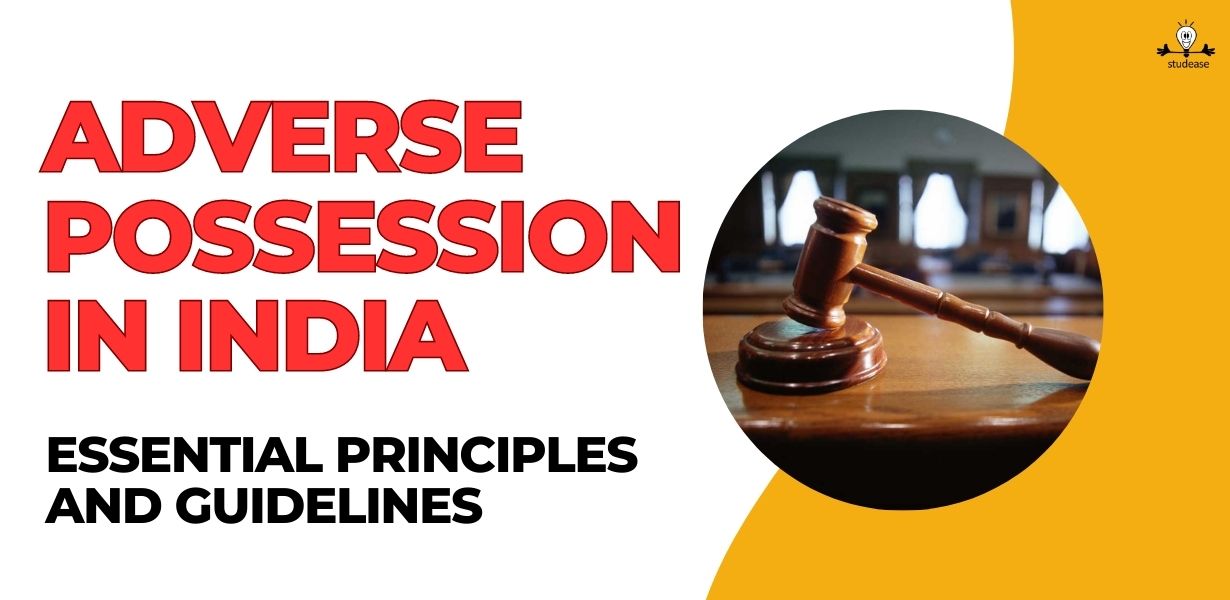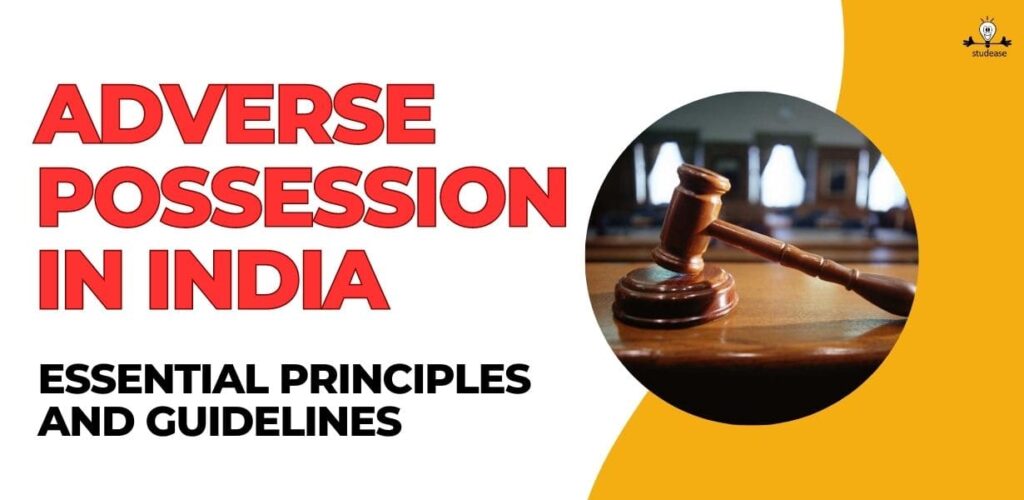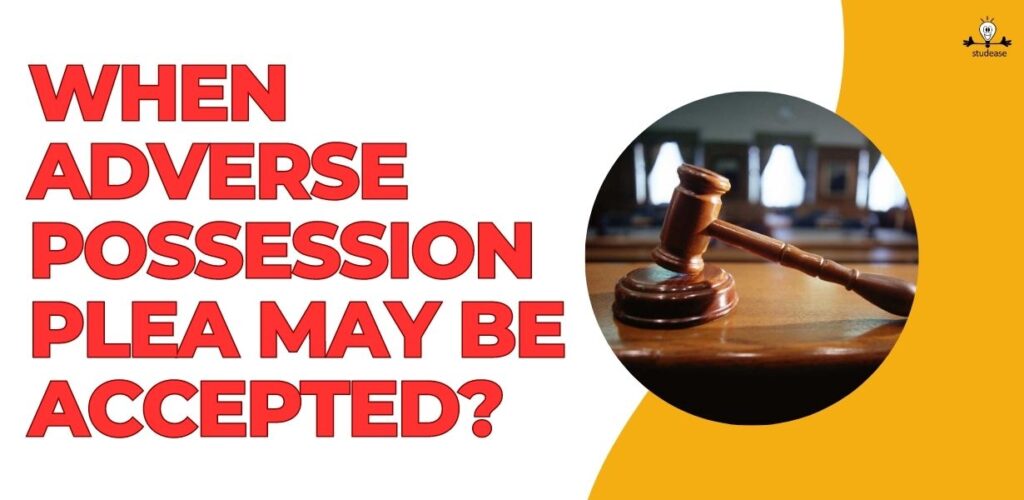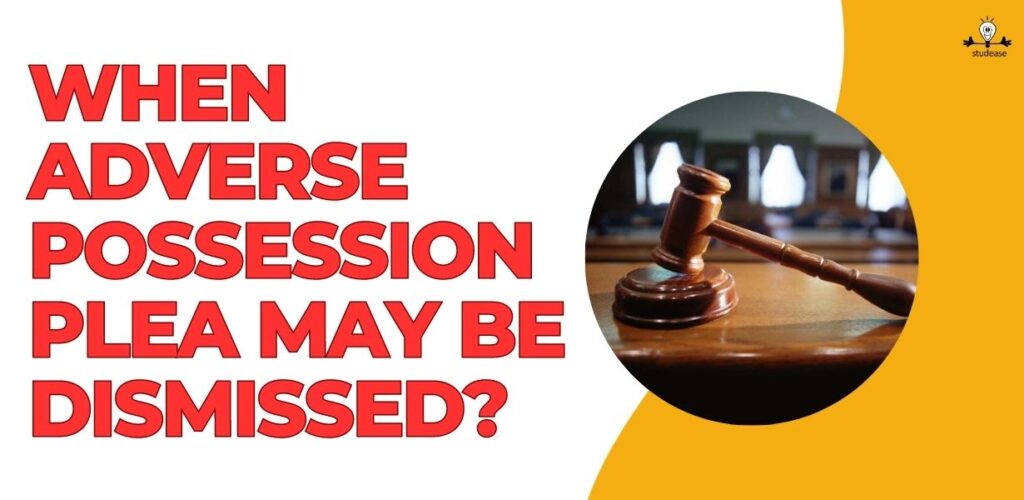Law Relating to Adverse Possession in India: Essential Principles and Guidelines

Possession of immovable property refers to having physical control or occupancy over land, buildings, or other fixed assets that cannot be easily moved. It signifies the holding or occupation of real estate or property that is not movable or portable.
In the context of immovable property, possession can have different legal implications and may vary across jurisdictions. It can be classified into various categories, such as:
- Actual possession: This refers to physical occupation and control over the property. The person in actual possession exercises control, uses, and enjoys the property.
- Constructive possession: In some cases, a person may not have physical occupancy but still exercises legal rights and control over the property.
- Adverse possession: This is a legal doctrine that allows a person to gain ownership rights over someone else’s property by occupying and using it openly, continuously, exclusively, and without the owner’s permission for a specified period.
- Joint possession: When multiple individuals share control or occupancy of a property, it is referred to as joint possession. Each co-owner or joint tenant has a partial interest in the property.
Possession of immovable property can have important legal implications related to ownership, rights, and disputes. It is often governed by specific laws and regulations in each jurisdiction.
What is Adverse possession?
Adverse possession is a legal concept in India that allows an individual to gain ownership of a property by possessing it openly and continuously for a period of 12 years even if another person is the legal owner. This principle has evolved and expanded over time, with roots tracing back to the initial introduction of the doctrine in 1907. In this post, I will discuss regarding Law Relating to Adverse Possession in India and its precedents.
One of the primary rationales behind adverse possession is the belief that land should not remain idle or unproductive, and thus, the law rewards the individual who demonstrates a consistent effort in maintaining and improving a piece of property despite not holding legal title.
The Law of Adverse Possession in India is governed by Article 65 of the Limitation Act. For a claimant to successfully establish adverse possession, they must display actual, visible, exclusive, hostile, and continued possession of the property in question, without the true owner’s permission, for the stipulated period of 12-years. This doctrine is based on the principle that if a legal owner fails to assert their rights against a possessor within the allotted time, their ownership rights may be extinguished.
The Indian judiciary has explored and defined the parameters of adverse possession in numerous cases, giving shape to the doctrine’s practical application. It is important to note that the burden of proof lies with the person claiming adverse possession to establish their case convincingly.
This area of law remains a subject of ongoing debate and analysis in the Indian legal scenario, and understanding its intricacies is essential for safeguarding property rights and navigating disputes effectively.
- Concept and Elements of Law relating to Adverse Possession in India
- Legal Framework and Limitation Act
- When Adverse Possession Plea may be Accepted?
- When Adverse Possession Plea may be Dismissed?
- Burden of Proof
- Adverse Possession and Tenants
- Adverse Possession and Government Property
- Significant Judgments and Rulings
- Conclusion
- What Next?
Concept and Elements of Law relating to Adverse Possession in India
Animus Possidendi
Adverse possession is a legal doctrine rooted in the principle of animus possidendi, which refers to the intent to possess land owned by another. For a possession to be adverse, the trespasser must have an intention to dispossess the true owner, and not merely occupy the land. This animus to dispossess distinguishes adverse possession from casual occupation or temporary trespass.
Actual Possession
Actual possession is a vital element of adverse possession, as it reflects the physical presence of the trespasser on the land. The trespasser must perform actions that physically demonstrate their dominion over the land, which could include building structures, planting crops, or fencing the area. This occupation should be for the trespasser’s permanent usage and must be distinct from the true owner’s possession.
Exclusive Possession
For a claim of adverse possession to succeed, the trespasser’s possession must be exclusive, meaning that the occupation cannot be shared with the rightful owner. This ensures that the possession is adverse and not a shared arrangement, as that would undermine the adversarial nature of the doctrine.
Uninterrupted Possession
Uninterrupted possession is another essential element of adverse possession. According to the Transfer of Property Act, 1882, the trespasser must maintain continuous possession for at least 12 years. This means that the trespasser should not abandon the land or allow the true owner to regain control during this period.
Possession Enjoyed Openly
For a claim of adverse possession to be successful, the possession must be open and visible to the public. This public knowledge of the occupation allows the true owner an opportunity to be aware of the trespass and take appropriate steps to assert their ownership rights.
Continuity
Continuity of the trespasser’s possession is essential to establishing a valid claim of adverse possession. The occupation should persist over the entire 12-year period without any interruptions or significant gaps. This continuous occupation is necessary to demonstrate that the trespasser has maintained control and dominion over the land throughout the prescribed period.
Also Check: Criminal Law Procedure to Lodge FIR in India
Legal Framework and Limitation Act

Limitation Act, 1963
The Limitation Act, 1963 governs the legal framework relating to adverse possession in India. The fundamental principle behind this act is to provide a specific period within which a rightful owner can claim his/her right over an immovable property. If the rightful owner fails to claim the property within the stipulated time, their ownership rights can be extinguished.
Section 27
Section 27 of the Limitation Act deals with the extinguishment of ownership rights if the prescribed limitation period expires. As per this section, if an immovable property is adversely possessed for the specified duration, the rightful owner’s rights over the property are considered extinguished, and the adverse possessor gains ownership rights.
Article 65
Article 65 of the Limitation Act is central to the concept of adverse possession. It sets the period of 12 years as the time frame within which a claim of title over immovable property can be made based on adverse possession. The 12-year period begins when the possession becomes adverse to the actual owner.
Article 112
Article 112 of the Limitation Act deals with the right to recover possession of immovable property. It provides a 30-year limitation period for a suit to recover property or compensation when the defendant’s possession was adverse to the plaintiff.
The legal framework for adverse possession in India is governed by the Limitation Act, 1963. Key sections and articles such as Section 27, Article 65, and Article 112 detail the requirements and limitations in claiming an immovable property based on adverse possession.
When Adverse Possession Plea may be Accepted?

There are several conditions as discusssed earlier, which need to be met for a court to accept a plea of adverse possession.
Firstly, the possession must be “actual” or “physical.” This means that the individual claiming adverse possession must have exercised control over the property.
Secondly, the possession must be “open and notorious.” The person claiming adverse possession should be occupying the property in such a manner that it is evident to the true owner, as well as the general public.
Thirdly, the possession must be “hostile” or “adverse” to the interests of the true owner. This implies that the possessor must occupy the land in a manner that demonstrates their intent to claim the property as their own, violating the owner’s legal rights.
Lastly, the possession must be “continuous and uninterrupted” for the entire statutory period.
Some additional factors that Indian courts consider when evaluating an adverse possession plea include:
- The type of land in question (agricultural, residential, or commercial)
- Any documentary evidence supporting the claim of adverse possession, such as tax receipts, which may indicate longstanding possession.
For an adverse possession plea to be accepted in India, the possessor must meet specific criteria, including actual possession, open occupation, hostile possession, and continuous and uninterrupted possession for the required period. In addition to these fundamental requirements, Indian courts may also consider other relevant factors and evidence when deciding on the validity of an adverse possession claim.
When Adverse Possession Plea may be Dismissed?

In India, the conditions for adverse possession are laid down under the Limitation Act, 1963. However, certain circumstances may lead to the dismissal of an adverse possession plea.
One key element in which an adverse possession plea may be dismissed is if the possession was not continuous, exclusive, hostile, and open for the statutory time period.
Another possible reason for dismissal of an adverse possession plea is partial occupation of the land. In order to claim title, the occupation must be total, meaning the entire land in question must be possessed by the claimant. If only a portion of the land is occupied, the claim will not be valid.
Additionally, if the claimant fails to satisfy the requirement of a hostile occupation, their plea may be dismissed. A hostile occupation means that the possession is taken without the owner’s consent, and the claimant has a clear intention to claim the land as their own.
A claim of adverse possession may also be dismissed if the possession is concealed, secret, or not open and visible. The occupation must be in such a way that the true owner and the general public are aware of it. If the property is occupied discreetly, it will not fulfill the criterion of open and notorious possession, leading to the dismissal of the plea.
To sum up, an adverse possession plea may be dismissed under several conditions, including lack of continuous occupation, partial occupation, non-hostile possession, and concealed or secret possession.
Also Check: Guide to Prepare for Judiciary Exams
Burden of Proof
In cases of adverse possession, the burden of proof lies on the person who claims the title by way of possession. This means that the individual asserting adverse possession must demonstrate, by clear and unequivocal evidence, that their possession was hostile to the true owner of the property.
It should be noted that the burden of proof is higher for cases involving government property or public organizations. In these cases, the period of adverse possession required to claim ownership is generally 30 years.
The burden of proof for adverse possession claims in India rests on the claimant.
Adverse Possession and Tenants
Can Tenant Claim Adverse Possession?
A tenant is someone who has the owner’s consent to occupy the property, while a trespasser occupies the property without the owner’s consent.
In general, a tenant cannot claim adverse possession because they have the consent of the owner of the property. However, if a tenant possesses the property for 12 years or more without any interruption from the owner and fulfills the necessary conditions of adverse possession, they might be able to claim ownership rights.
Rental Agreement
A rental agreement is a short-term contract between a property owner and a tenant. These agreements typically last for a month or a few months and are renewable. Rental agreements usually do not grant a tenant exclusive possession; the owner retains the right to enter or inspect the property as needed.
In the context of adverse possession, a tenant under a rental agreement is less likely to successfully claim ownership rights since they don’t have exclusive possession, and the agreement is of a short duration.
Lease Agreement
A lease agreement is a long-term contract between a property owner and a tenant. Lease agreements generally extend for a period of years, during which the tenant has exclusive possession of the property. The owner may not enter or inspect the property without prior notice or the tenant’s consent.
In this case, a tenant might have a better chance of claiming adverse possession if they meet the necessary legal conditions during the lease period.
However, since there is usually an agreement in place between the owner and the tenant, it might be more challenging for a tenant to prove their possession is without the owner’s consent.
To conclude this, while tenants generally cannot claim adverse possession due to existing agreements with the property owner, certain conditions and circumstances might allow for such a claim. It’s crucial for both property owners and tenants to understand these differences and take appropriate steps to protect their rights.
Adverse Possession and Government Property
The concept of Adverse possession, this doctrine was introduced in India in 1907 and is derived from common law principles.
When it comes to Government property, the application of adverse possession becomes more complex. Immovable property owned by the government is generally protected from adverse possession claims. The rationale behind this is to prevent unauthorized encroachment or unlawful acquisition of government land, which may harm the public interest.
However, there are exceptions to this general rule. In some cases, immovable government property may be subject to adverse possession if the possession satisfies certain criteria.
For example, if the person in possession has been in exclusive and continuous possession of the land without any interference from the Government or other parties, and if the Government has been aware of such possession, there may be grounds for a successful claim.
Additionally, the law of adverse possession in India acknowledges that there may be special instances where the Government may choose to waive its immunity against adverse possession claims. This could occur if the Government agrees to allow the adverse possessor to continue occupying the land under specific terms and conditions, or if the land is acquired through a legal framework that permits such acquisition.
The application of this legal doctrine, however, should be carefully examined to ensure that public interests are safeguarded and unauthorized encroachments or acquisitions of government lands are prevented.
Significant Judgments and Rulings
Amarendra Pratap Singh v. Tej Bahadur Prajapati
In the case of Amarendra Pratap Singh v. Tej Bahadur Prajapati, the Supreme Court of India laid down important guidelines regarding adverse possession. The court held that a person in possession cannot be ousted by another person except by due procedure of law, and once the 12-year period of adverse possession is over, even the legal owner’s right to eject the possessor is extinguished.
Perry v. Clissold
The case of Perry v. Clissold established the legal maxim, “A person in possession is not to be ousted except by due process of law.” This case emphasized the importance of legal procedure and the protection of rights for individuals in possession of property.
Gurudwara Sahab v. Gram Panchayat Village Sirthala 2014
In Gurudwara Sahab v. Gram Panchayat Village Sirthala 2014, the court upheld the rights of the defendant based on the principle of adverse possession. The court noted that the defendant had been in possession of the land for more than 12 years, thereby fulfilling the legal requirements for claiming adverse possession.
State of Uttarakhand v. Mandir Shri Lakshmi Siddh Maharaj
The Supreme Court, in State of Uttarakhand v. Mandir Shri Lakshmi Siddh Maharaj, gave a comprehensive judgment on the concept of adverse possession. It held that Article 65 of the Limitation Act, 1963 not only allows a person to use adverse possession as a defense but also to assert it to protect or recover possession of immovable property in case of dispossession.
Nair Service Society Ltd. v. K.C. Alexander, AIR 1968 SC
In the case of Nair Service Society Ltd. v. K.C. Alexander, AIR 1968 SC, the Supreme Court of India provided clarity on the elements required for establishing adverse possession. These elements include uninterrupted possession, open and notorious possession, and possession with an intention to possess as the legal owner.
Ravinder Kaur Grewal v. Manjit Kaur 2019
In Ravinder Kaur Grewal v. Manjit Kaur, the Supreme Court reiterated the importance of the 12-year limitation period for adverse possession. The court opined that, after the expiration of this period, the legal owner loses his or her right to reclaim the property, effectively establishing the possessor’s rights over the property.
Also Check: What are the rights of Arrested Person?
Conclusion
The time frame required for claiming ownership through adverse possession is usually 12 years, as stated under the Indian Limitations Act and 30 Years in case of Government’s property. This period may vary, however, depending on certain other factors. If a person successfully fulfills the legal requirements of adverse possession, they can obtain the title of the property, thereby becoming the true owner.
In contrast, the actual owner may lose their ownership rights due to their default or inaction in asserting their interest in the property within the specified time period.
Property owners, on the other hand, are encouraged to exercise due diligence in monitoring their property and asserting their ownership rights to prevent losing their title due to adverse possession claims. This ensures that properties are not left abandoned and are utilized effectively.
The law of adverse possession helps to maintain a balance between the interests of true property owners and those who actively possess the property without legal title. By understanding and adhering to the principles and requirements of adverse possession, both parties can safeguard their respective interests in the world of real estate in India.
What Next?
We at studease encourage students to prepare well and stay informed. For more Content, Join our Telegram group to stay updated.
Join: studease Telegram Channel
Follow us: instagram
Subscribe: studease Youtube Channel
Download studease App:







